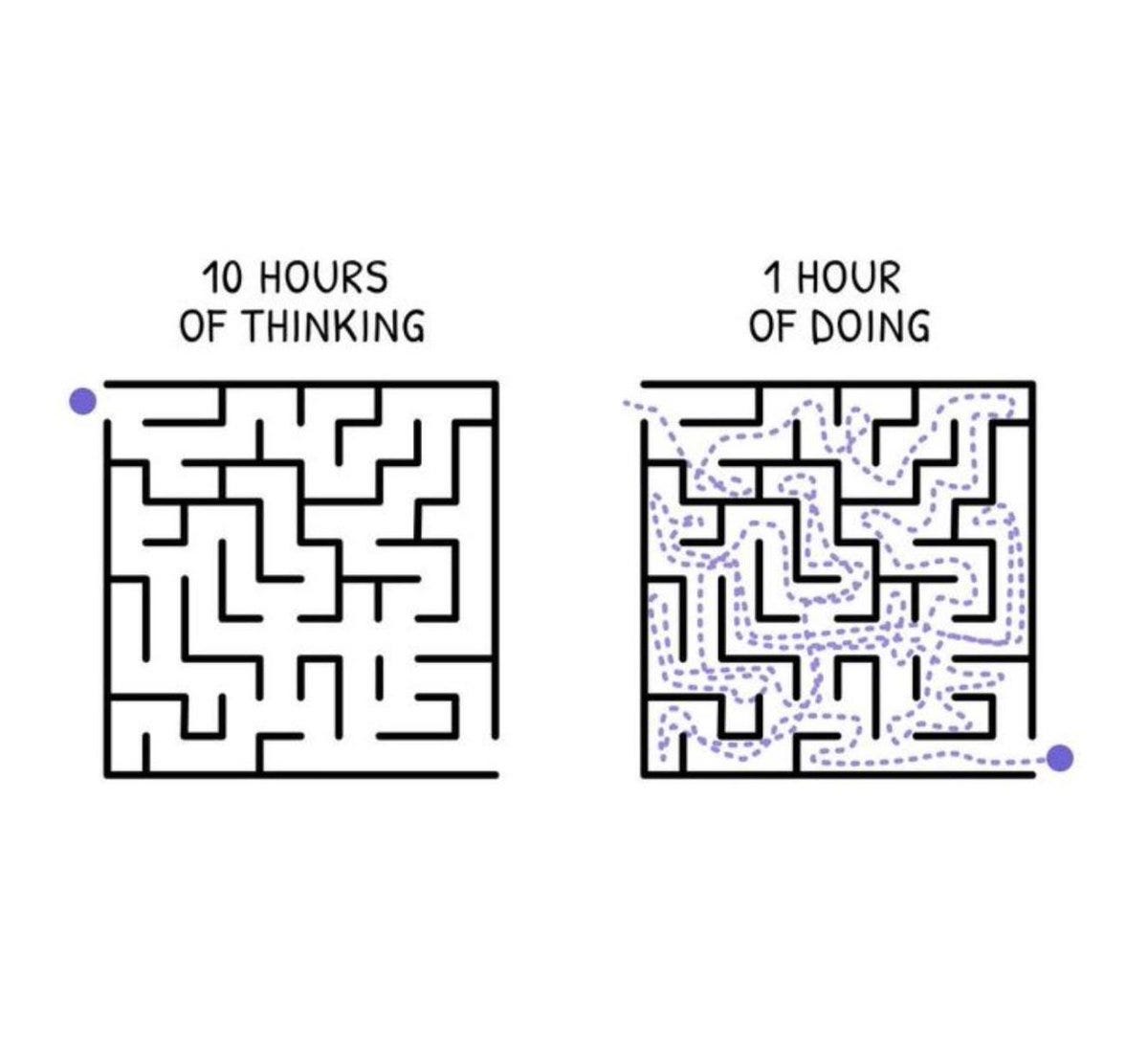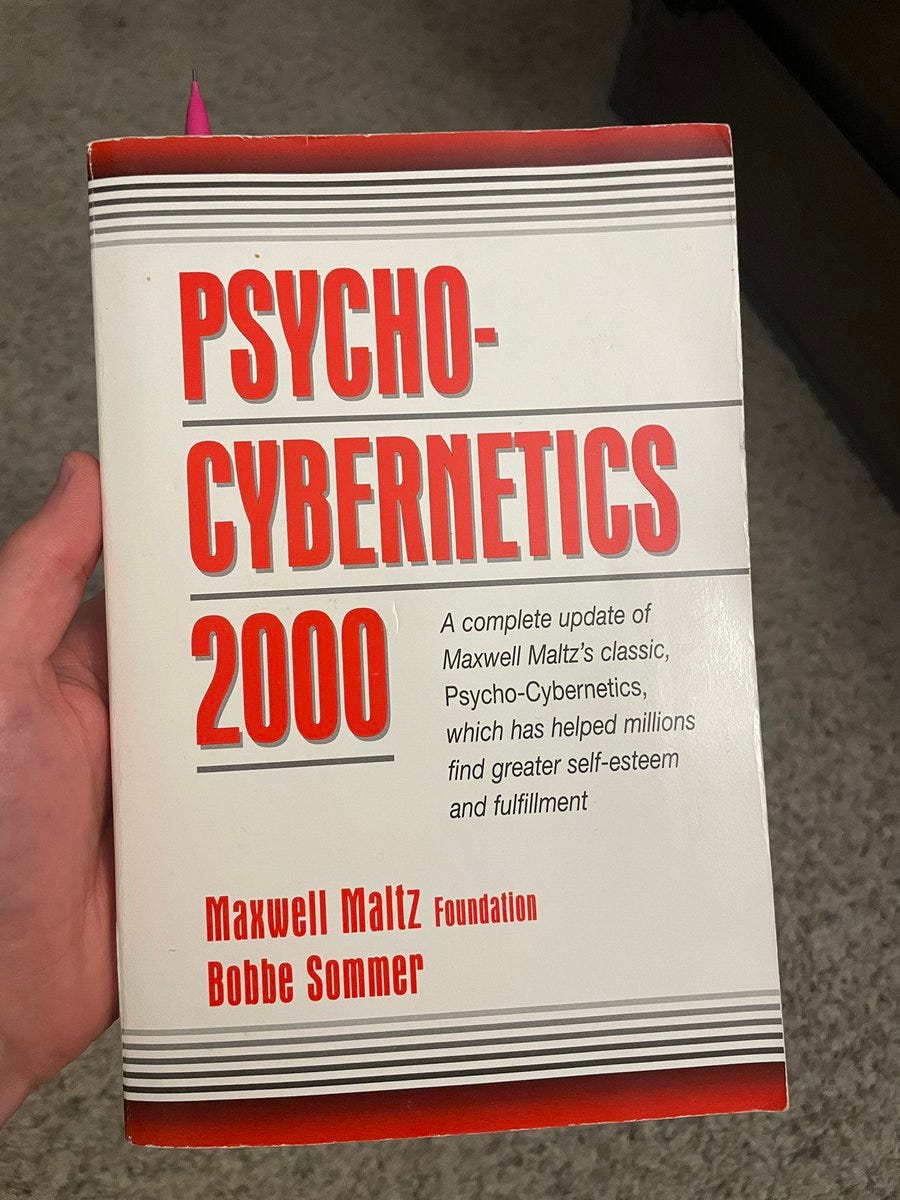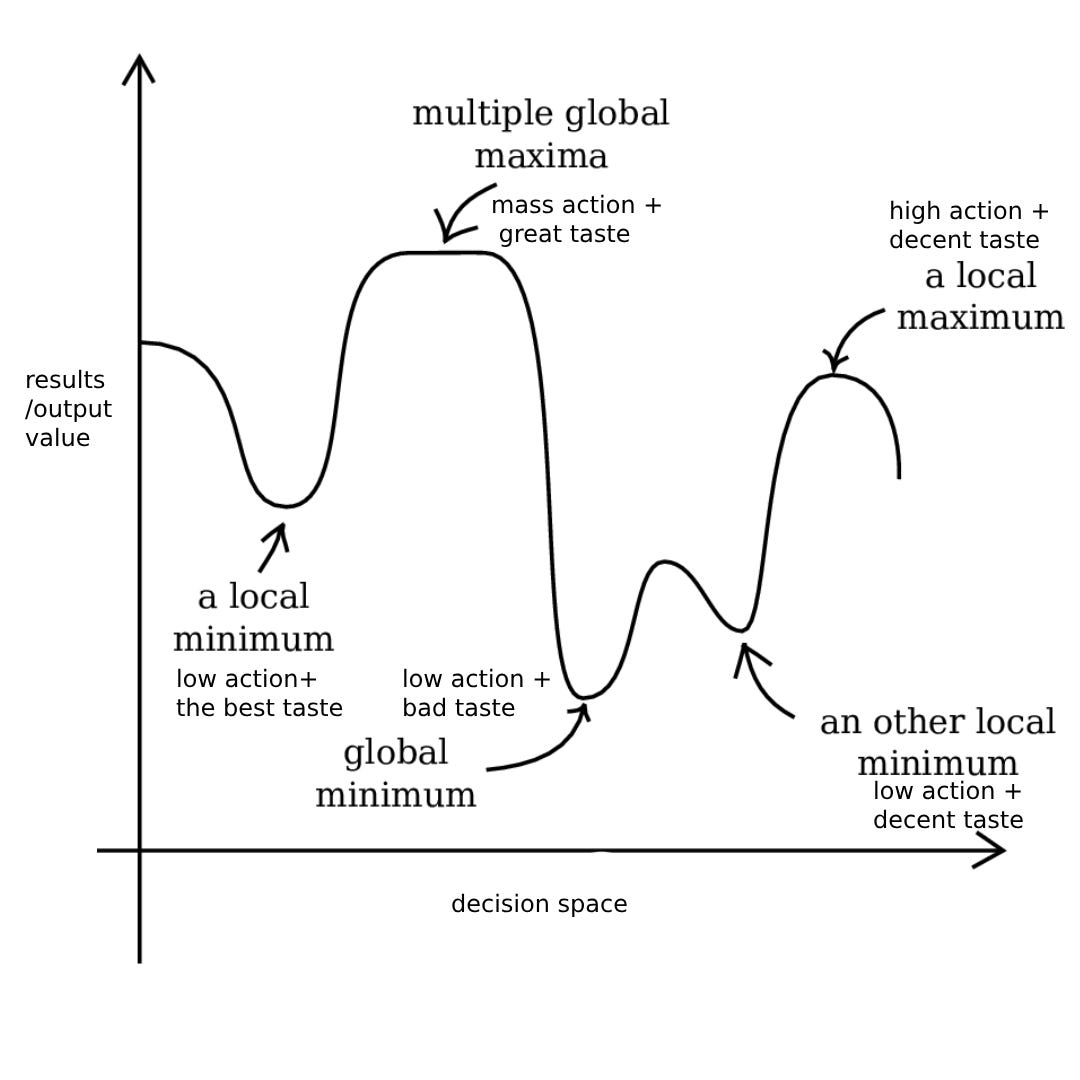Below is a series of tweets I published on 5/23/25. I believe they merit their own post as I am quite confident in the presented ideas and they have fundamentally shaped my work.
you're not wasting time, you are using your attention sub-optimally. it's illogical to say you're wasting time as that implies time is a resource to use. you use attention, not time.
wasting time is like saying you're wasting space. it doesn't make sense. space exists whether we use it or not. we can't actually waste or use space itself, only occupy it. neither time nor space are resources we actively consume or deplete through use. the best you can do is move around the space (your attention) as much as possible in the most optimal manner (spreading out).
most productivity advice is solving the wrong problem. they tell you to "manage your time better" but time management is impossible. time moves at a fixed rate regardless of what you do. what you can manage is where you point your attention within the margins (that we can't see)
attention has bandwidth limitations. time does not. you can't stretch time but you can focus or dilute your attention. this is why multitasking feels inefficient sometimes. you're splitting finite attention across multiple targets, not using time better.
the key is training your attention to prefer globally optimal choices even when they're locally harder (ie long term satisfaction is always worth the sacrifice of short term pleasure)
the phrase 'killing time' is accidentally accurate. time dies whether you participate or not. what you're really doing is letting your attention go aimlessly instead of directing it purposefully. attention is what you control.
deadlines work because they create artificial scarcity around attention allocation, not time scarcity. the time was always going to pass. the deadline forces you to finally direct your attention toward the task instead of letting it scatter across infinite options.
a sense of urgency is really just compressed attention allocation. the urgency feeling is your brain finally committing its full attention bandwidth to one target
follow up thread on taste
taste is the filter that determines where you direct your attention. having good taste means your attention naturally gravitates toward high signal opportunities such as the right research problems, the correct business ideas, the best mental models. bad taste means your attention gets pulled toward low value targets that you identify as good.
it's about pattern recognition for quality and potential. good taste is the ability to sense which problems are worth solving, which people are worth learning from, which ideas are worth exploring. it's attention allocation intuition. basically, sifting the signal from the noise.
most people optimize their attention management (focus, deep work, etc) but ignore taste development. you can be incredibly focused on the wrong things. perfect execution of a bad idea is still a bad outcome. taste determines the what before focus determines the how
hamming talks about this. "There are many right problems, but very few people search carefully for them. Rather they simply drift along doing what comes to them, following the easiest path to tomorrow. Great scientists all spend a lot of time and effort in examining the important problems in their field."
before you even decide where to focus , your taste has already eliminated most options from consideration. people with bad taste don't even see the best opportunities because their filter screens them out. taste is a closing down while simultaneously being open to the absurd, weird, and different.
developing taste requires exposing your attention to high quality examples. you can't develop good taste for research problems without studying great research. you can't develop business taste without observing successful businesses. taste is pattern recognition trained on the right kind of excellence
one of my favorite quotes from steve jobs
taste is pattern matching excellence using abstract and concrete rules
bad taste compounds. if you consistently direct your attention toward low quality inputs (bad books, mediocre thinkers, shallow problems) your taste degrades further. you lose the ability to distinguish signal from noise.
taste can be developed through deliberate exposure and reflection. spend attention on the highest quality examples you can find in your field. study what makes them different. gradually your taste improves and your attention gets drawn toward better opportunities automatically. but, concrete rules do not always work. in fact, the best taste is just vibes eg rick rubin
both attention and taste management and development are much much more important than "don't waste your time." throw out that advice
follow up thread on how you know if you have good taste
good taste is validated by two markets: social and economic. the social market rewards you with recognition, respect, and status when your taste aligns with what others value. the economic market rewards you with money when your taste identifies value before others do or you do it in a more "tasteful" way.
the social market judges your taste through peer recognition. if you consistently recommend books people love, identify talent before others notice, or spot trends that gain acceptance, you gain social credibility. people start asking for your opinion because your taste has market value.
do you want to know how i know i have good taste? because im literally told irl i have good taste. this is said to me, a lot. also, a lot of my beliefs, actions, practices, etc. line up with what expierneced people with sucess in social and economic markets do (without me knowing they are already succesful in the markets!). How well do your priors match with success in the markets? (However this method of validation of your taste does not work well with novel taste).
reading social market feedback: do people seek your recommendations ? do your predictions about trends prove accurate over time ? do others copy your choices ? consistent social validation suggests your taste filter is good quality.
the economic market judges your taste through financial returns. if your taste leads you to undervalued assets, good startups, emerging markets, or profitable niches you get monetary feedback. the market pays you for having better taste than average.
economic market feedback: do your investments (time, money, attention, etc) generate positive returns? do you identify opportunities before they become obvious? do you avoid disasters that others fall into? economic feedback is often more objective than social feedback but less consistent
there's situations in which economic feedback is much more important and responsive. eg if you do something that your peers feel is in bad taste, you receive poor social feedback, but if what you do results in good monetary feedback, the economic market ultimately wins
social markets can have systematic biases. academic social markets might reward complexity over clarity, business social markets might reward confidence over accuracy. economic markets have biases too but they are self correcting over longer time horizons. bad taste eventually loses money
the best taste sometimes requires ignoring one market temporarily to succeed in the other. contrarian investors ignore social disapproval to make economic returns. artists ignore economic feedback to maintain social credibility in their field or for timing trends. timing the switch between markets also matters.
good taste should eventually show positive returns in at least one market. the ultimate validation is taste that succeeds in both markets over time. you identify value that's both economically profitable and socially recognized as good.
sometimes taste validation requires extremely long time horizons. darwin's taste for natural selection faced decades of social rejection before scientific acceptance, then over a century before broad social acceptance. good taste often means believing in something before either market rewards you.
having good taste requires a type of belief in yourself. high conviction despite social disapproval and economic losses in the short term. you need enough self-esteem (some to a narcissistic degree, just look at early kanye) to withstand being called wrong, crazy, or naive. most people abandon good taste under social pressure before markets can validate them.
follow up thread on action
it's all just action isn't it? like that's all it comes down to? input is pretty much useless without action. your action levels should 2-3x your input levels. it seems input lies on a coin with action on the other side and the coin is not complete with just one side filled in.
take more action than anyone you know in the domains you want to succeed in and you will dominate. think massive action gradients.
most people probably have this backwards (or their habits do). they consume 10 hours of content for every 1 hour of action. they read about fitness instead of working out. they watch business videos instead of starting businesses. they're optimizing for feeling prepared rather than getting results.
action creates better feedback loops than input. when you act reality immediately tells you what works and what doesn't. when you just consume input you're getting someone else's processed experience. it is not raw feedback from the domain you care about.
if attention is your most valuable resource and you want to direct more of it toward action not consumption. consuming other people's insights about a domain is lower leverage than generating your own insights through action.
action reveals taste in ways input cannot. you can read about what makes good design but you only develop taste by making lots of design decisions and seeing what works. action calibrates your judgment through direct experience rather than theoretical knowledge.
if everyone else in your domain takes 10 actions per week you take 30. if they ship 1 project per month you ship 3. the gradient creates an experience gap that becomes unbreachable over time because of feedback loops and taste refinement.
action is taste refinement. you update your priors extremely efficient compared to just inputting. however, input is still very important for guiding our initial action and what steps we take. good taste input is extremely important.
action compounds differently than knowledge. knowledge has diminishing returns bc you eventually know enough for your action level. action has increasing returns. each action teaches you something that makes the next action more effective. action creates momentum that input alone cannot.
the real risk is spending years preparing for a life you never actually live. input without action is elaborate procrastination. the input becomes useless, you just wasted your attention.
you need both sides of the coin but the ratios matter. too much input and you're just a well informed observer. too much action without any input and you're just randomly flailing. but most people need to flip the ratio dramatically toward action.
it is recognizing that the fastest way to get good at something is to do it badly first then iterate (but start with good input). the market/reality/domain will teach you faster than any book or course.
when you dramatically increase your action levels you stop competing with people who are still optimizing for theoretical understanding
more action also means less competition. more action allows for more refinement on your end rather than going off someone else's work (input) which allows your authentic self to shine and take part in the real world. no one else has that. no one else can take that from you.
taste should guide which inputs you consume and which actions you take. good taste means your limited input time gets allocated toward high quality sources. not random blog posts or shallow content. your taste filter determines whether your actions are experiments worth running.
most people consume inputs randomly then wonder why their actions feel unfocused. your taste acts as a pre-filter for both consumption and action. without good taste you might take massive action but in low leverage directions that waste your energy which results in a feedback loop of negativity.
action is experimenting with your inputs. reading about negotiation is input. actually negotiating is testing whether that input maps to reality. action reveals which inputs were useful and which were theoretical noise that doesn't survive contact with the real world.
thus the action/taste cycle works its magic. the more action you take, the more refined your taste will become. over time you embody the principles that actually work rather than just intellectually understanding concepts that sound good but don't produce results.
effective embodiment requires this action testing cycle. you can't embody something that well you've only read about. embodiment means the knowledge has become intuitive through some amount of action.
people with bad taste might take massive action but on poorly chosen inputs, leading to massive wasted effort. people with good taste but low action never test their taste against reality so it remains useless theory. you need both high quality input selection and high volume action testing.
you read about cold email templates then immediately send 5 cold emails testing different approaches. most people read the article and do nothing. the action reveals which templates actually get responses versus which sound good in theory. even just sending the cold emails to yourself to see which one you like the best is so much better than only reading the article.
even after reading a knowledge post or video and taking 5 min afterwards to distill what you learned, make mind- maps, etc is so much more effective than just inputting.
i would refine the right map (below) to 15 min of understanding the problem, then taking action. however, most people mistake that 15 min for the 10 hrs and never take any action
another example: if you are not running experiments like this, you are in a locally optimal solution that could be much improved by action
“Action produces information. Just keep doing stuff.”
— Brian Armstrong
this is why psycho-cybernetics is very good. it prioritizes and demands you take action instead of just reading the book. it has many practices, worksheets, and other things to do
more action also produces a higher signal to noise ratio of feedback than just input
action + taste levels determine how well you navigate a decision space
your action level and taste level determine exactly where you end up on the results landscape. this chart maps the different quadrants to specific positions in decision space.
low action + bad taste: you're stuck in the global minimum. you don't explore enough to find better positions and your taste doesn't guide you toward promising directions when you do move. you stay in the worst possible spot.
low action + decent taste: you end up in local minima. your taste can identify better opportunities but you don't take enough action to reach them. you see the mountain peaks from the valley but never climb out.
low action + great taste: paradoxically also leads to local minima. even perfect taste can't help you if you don't act on it. you can identify the global maxima perfectly but theoretical knowledge without execution leaves you in a valley.
high action + decent taste: you reach local maxima. you take enough action to climb hills but your taste isn't refined enough to guide you toward the highest peaks. you work hard and get decent results but miss the biggest opportunities.
mass action + great taste: you reach global maxima. your taste guides you toward the highest value areas and your massive action volume lets you navigate there efficiently. you optimize the right things and do it at scale.
most people assume more action automatically equals better results but the chart shows this isn't true. low action with any level of taste keeps you in valleys. you need minimum viable action volume just to escape the bottom regardless of how good your taste is.
great taste with low action performs around the same as bad taste with low action. taste without action is just procrastination. the landscape doesn't care how well you can identify good opportunities if you don't pursue them.
you can diagnose your position by looking at effort vs results. if you're working moderately hard with decent results you're probably at a local maximum. if you're barely working regardless of your knowledge level you're in a valley somewhere that can be improved.









